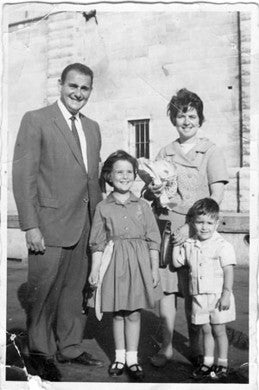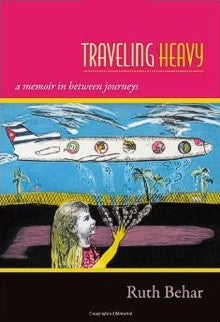 “Travelers are those who go elsewhere because they want to, because they can afford to displace themselves. Immigrants are those who go elsewhere because they have to. If they don’t displace themselves they’ll suffer: their very existence is at risk. They pick up and leave, sometimes at a moment’s notice. Now I’m a traveler, but I always remember I started out in life being an immigrant. I carry the memory of the girl who felt utterly foreign, helpless, speechless, a misfit; the girl who wanted to dissolve into the cracks in the walls.”
“Travelers are those who go elsewhere because they want to, because they can afford to displace themselves. Immigrants are those who go elsewhere because they have to. If they don’t displace themselves they’ll suffer: their very existence is at risk. They pick up and leave, sometimes at a moment’s notice. Now I’m a traveler, but I always remember I started out in life being an immigrant. I carry the memory of the girl who felt utterly foreign, helpless, speechless, a misfit; the girl who wanted to dissolve into the cracks in the walls.”
–Ruth Behar
From the introduction to Traveling Heavy
Traveling Heavy is a deeply moving, unconventional memoir by the master storyteller and cultural anthropologist Ruth Behar. Through evocative stories, she portrays her life as an immigrant child and later, as an adult woman who loves to travel but is terrified of boarding a plane. With an open heart, she writes about her Yiddish-Sephardic-Cuban-American family, as well as the strangers who show her kindness as she makes her way through the world. Compassionate, curious, and unafraid to reveal her failings, Behar embraces the unexpected insights and adventures of travel, whether those be learning that she longed to become a mother after being accused of giving the evil eye to a baby in rural Mexico, or going on a zany pilgrimage to the Behar World Summit in the Spanish town of Béjar.
Behar calls herself an anthropologist who specializes in homesickness. Repeatedly returning to her homeland of Cuba, unwilling to utter her last goodbye, she is obsessed by the question of why we leave home to find home. For those of us who travel heavy with our own baggage, Behar is an indispensable guide, full of grace and hope, in the perpetual search for connection that defines our humanity.
Buy online
BN.com
View book trailer
Duke UP
Available in Audible Audio Edition, narrated by Sally Martin
Features
Emily Burack, “Taking the Road: Jewish Women’s Travel Writing,” Jewish Book Council, August 19, 2020.
Marion Fischel, “Confessions of an anthropologist,” Jerusalum Post, March 19, 2014.
Judy Bolton-Fasman, “‘Traveling Heavy’ by Ruth Behar,” Boston Globe, Books, May 7, 2013.
Miriam Bradman Abrahams, Jewish Book Council, April 30, 2013.
Joshunda Sanders, “An Old Little Girl,” Kirkus Feature, April 24, 2013.
Interview with Sebastian Schulman, “Jewish Cuba: A First-Hand Account,” National Yiddish Book Center, Tuesday, April 23, 2013.
Praise
“‘Travelers are those who go elsewhere because they want to. . . . Immigrants are those who go elsewhere because they have to.’ Ruth Behar’s own story is one of being both the reluctant immigrant and the enthusiastic traveler, and finally, perhaps to appease both legacies, ‘an anthropologist who specializes in homesickness.’ Behar admits Spanish is her mother tongue, and yet she is a master craftsperson in her father tongue, English. As always, her exquisite stories leave me astonished, amused, exhilarated, illuminated, and forever transformed.” —Sandra Cisneros, author of House on Mango Street
“Ruth Behar takes us deep into geographies she has charted, transcending anthropological reportage and finding the poetry that is there not only in the places she has mapped but also in history. She has written an observant and surprisingly compassionate book, full of warmth. I enjoyed reading every page; it is full of wisdom and devastating sincerity.” —Nilo Cruz, author of Anna in the Tropics, winner of the Pulitzer Prize for drama
I keep a stack of books on my desk, a “to read” pile that taunts me all semester while I am teaching. I can never find the time to sit down with a book that is not directly related to one of my classes or my current research projects. Ruth Behar’s Traveling Heavy was somewhere in the middle of the pile, but since I will soon be moving to Germany for the year, I was inspired to read a book written by another itinerant academic.
This memoir absolutely enthralled me; I read it cover to cover without stopping. The essays are written in gorgeous prose, and Behar’s narrative voice is both introspective and informative without ever being pedantic. What fascinated me the most about this book was the author’s relentless search for belonging. As a Jewish Cuban, Behar meditates on the nature of diaspora and the importance of telling stories about who we are and where we come from. “Once a story has been told,” Behar writes, “it can never be lost.” —from the blog Literary Ethnography
